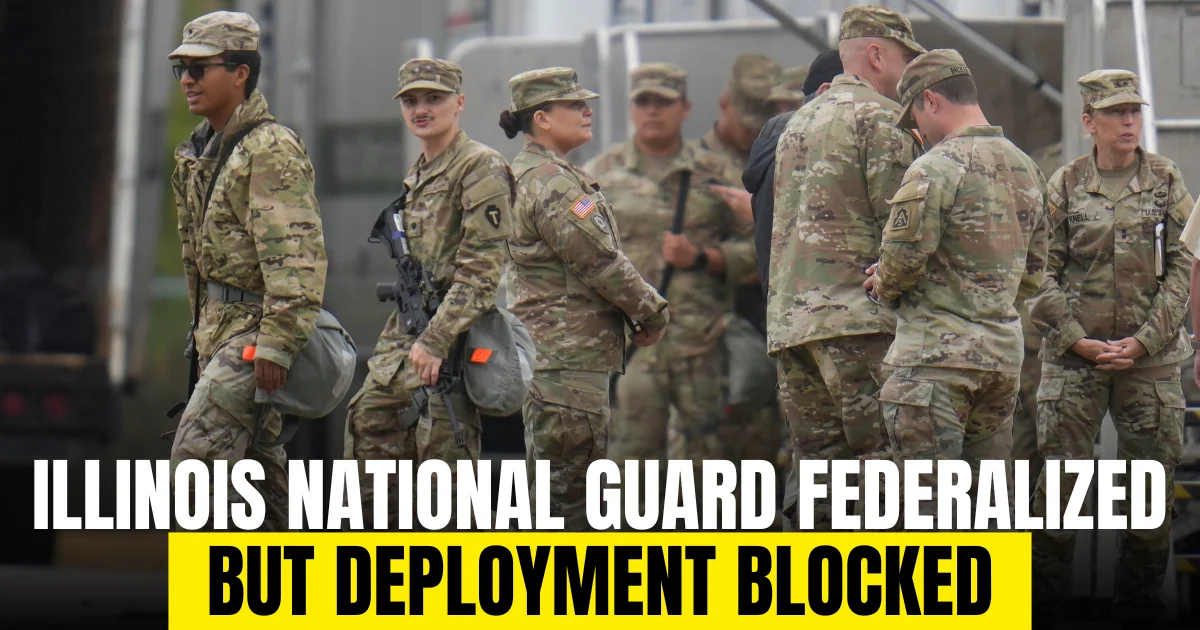Appeals court rules Illinois National Guard can stay federalized but can’t be deployed. Get the latest updates and legal insights.
Table of Contents
National Guard Troops in Illinois Can Remain Federalized but Deployment Blocked by Appeals Court
The legal battle over the federalization of National Guard troops in Illinois has taken a new turn. On Saturday, a federal appeals court ruled that while these troops can remain under federal control, their deployment is blocked as the appeals process continues. This decision marks another chapter in the ongoing dispute between the Trump administration and state authorities over the use of military force in domestic protests.
Appeals Court Temporarily Halts Deployment
The Seventh Circuit Court of Appeals temporarily paused part of a lower court’s order, which had halted National Guard deployments in Illinois for two weeks. The ruling clarified that:
- Troops can remain federalized.
- No operational deployment is allowed at this time.
- Guardsmen do not need to return to their home states unless further ordered by the court.
US Northern Command confirmed that troops in the Chicago area are currently engaged in planning and training, but are not conducting operational activities.
Troop Numbers and Federalization Context
As of midweek:
- 300 members of the Illinois National Guard are activated under Title 10.
- 200 members of the Texas National Guard are also stationed in Chicago.
The federalization is part of broader Trump administration efforts to deploy troops near ICE facilities amid protests in Democratic-led cities like Chicago and Portland.
Illinois State Leaders Respond
Illinois Attorney General Kwame Raoul described the ruling as a significant win for the state, highlighting its importance for local communities.
- Support for state and local law enforcement.
- Protecting community rights to peacefully protest.
The ruling follows a temporary restraining order by US District Court Judge April Perry, who argued there was “no credible evidence” of rebellion in Illinois to justify the federalization of troops. She also called Department of Homeland Security assessments of the protests “unreliable,” adding that sending troops could “only add fuel to the fire.”
Broader Legal and Political Implications
Leaders in Illinois and Oregon have strongly contested the Trump administration’s depiction of their cities as dangerous or “war-ravaged.” Several states have supported Illinois’ legal challenge:
- Maryland and 19 other states, along with Washington, DC and three governors’ offices, filed an amicus brief calling the federal deployment “unlawful, unconstitutional, and undemocratic.”
- The brief criticized the administration’s “shifting and expanding misuse of the National Guard” as a concentration of power the Founding Fathers warned against.
On the West Coast, the Ninth Circuit Court of Appeals is still deciding on the deployment of the Oregon National Guard to Portland ICE protests, with a temporary federalization allowed but deployment still blocked.
Key Takeaways from the Court Rulings
- Federalized but Restricted: Illinois National Guard troops remain under federal control but cannot be deployed operationally.
- Legal Precedent: Highlights tensions between state authority and federal powers under Title 10.
- Support for Local Law Enforcement: State leaders stress protecting civil rights and local governance.
- Ongoing Cases: Similar disputes continue in Oregon, with courts closely reviewing federal deployment authority.
FAQs
Q1: Can Illinois National Guard troops be deployed now?
A: No, the appeals court ruled that troops can remain federalized but deployment is temporarily blocked.
Q2: How many National Guard members are in Illinois?
A: As of Wednesday, 300 Illinois National Guard members and 200 Texas members were federalized in Chicago.
Q3: Why is the Trump administration deploying troops?
A: The administration aims to respond to ICE protests near federal facilities in Democratic-led cities.
Q4: What did the Illinois Attorney General say?
A: Kwame Raoul called the ruling a victory for state law enforcement and community rights.
Q5: Are other states involved in the legal battle?
A: Yes, Maryland, 19 other states, and Washington, DC filed briefs supporting Illinois’ position.
Conclusion
The appeals court ruling reinforces the delicate balance between federal and state powers in handling domestic military deployment. While Illinois National Guard troops remain federalized, operational deployment is blocked, reflecting ongoing legal scrutiny of executive authority.
Stay updated on this developing story as the courts continue to review National Guard deployment in other states, including Oregon.

